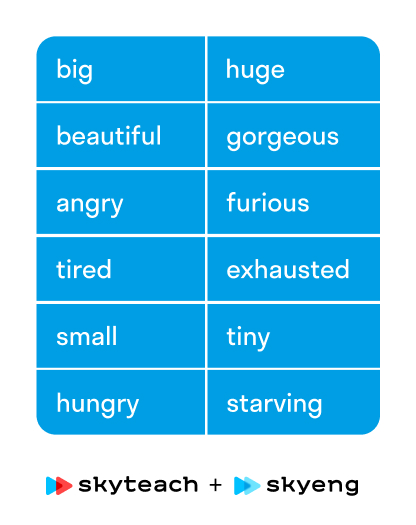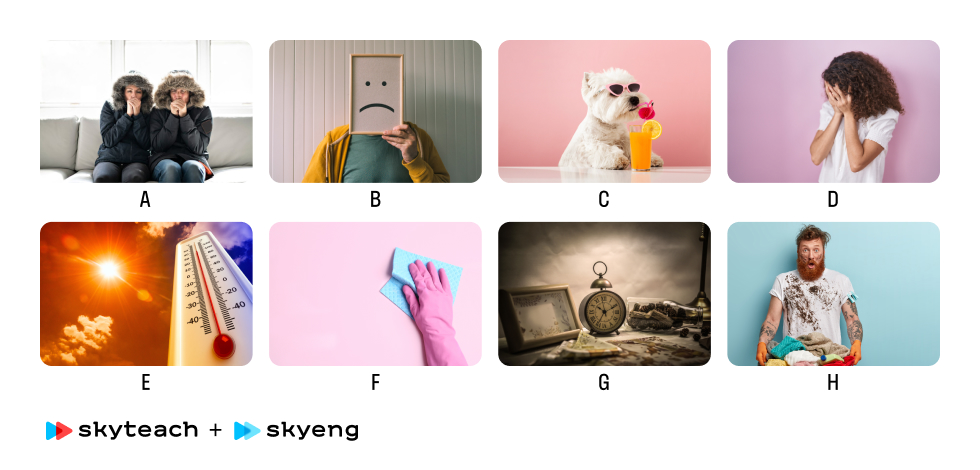Чтобы освежить память и отработать сильные или не градуируемые прилагательные, мы подготовили идеи для уроков, которые подойдут подросткам с уровнем Intermediate. Первые два упражнения помогут плавно перейти к теме и вспомнить правила использования этих прилагательных, а остальные — отработать их.
Lesson plan:
- Warm-up
- Compare
- Picture-word
- Talk about
- I get furious when
- I spy with my little adjective
- Responding
- Sound more extreme
- Substitution
Task 1. Warm-up
Начните урок с привычного вопроса: How are you today?
Дождитесь ответа и продолжайте вопрос: What if you slept at 03:00 am last night, how would you answer?
Предполагаемый ответ может быть “a little/a bit tired/sleepy”. Также дождитесь и добавьте: What if you have not slept at all, what would your answer be?
Запишите ответы, покажите студентам и попросите объяснить разницу между ними. На этом этапе примите все ответы.
Task 2. Compare
Подготовьте список слабых и сильных прилагательных.

Сначала обратите внимание учеников на первую колонку (слабые прилагательные) и попросите подумать, могут ли эти слова сочетаться с наречиями “very, extremely, a bit”. То же самое повторите со второй колонкой (сильные прилагательные).
После этого напомните им, что в первом списке таблицы представлены слабые прилагательные, а во втором сильные прилагательные, которые уже несут в себе идею “very”и с ними можно использовать такие наречия как: completely, absolutely, totally, etc.
Вам могут пригодиться и другие наши материалы по теме «Прилагательные»:
Task 3. Picture-word
Подготовьте список слабых и сильных прилагательных и фотографии, которые иллюстрируют эти слова. Попросите студентов соотнести слова и картинки.

- very hot — boiling;
- very funny — hilarious;
- very cold — freezing;
- very old — ancient;
- very afraid — terrified;
- very clean — spotless;
- very sad — miserable;
- very dirty — filthy.
Task 4. Talk about
Подготовьте несколько прилагательных, которые описывают эмоции. Дайте ученикам несколько минут подумать над заданием и попросите рассказать об описанных ситуациях. Предложите начать предложения следующим образом: “The last time I was astonished was when…”
Talk about the last time you were …
- astonished;
- exhausted;
- frustrated.
Talk about what situations were …
- thrilling;
- awkward;
- petrifying.
Task 5. I get furious when
Подготовьте несколько словосочетаний как “I get furious when…”, “I feel exhausted when…”, “It’s disgusting when…” и т. д. Попросите студентов составить предложения, которые будут правдивы для них.
I get furious when people eat in the public transport.
Task 6. I spy with my little adjective
Попросите учеников посмотреть вокруг и поискать предметы, которые можно описывать с помощью сильных прилагательных. Задача студентов — использовать конструкцию “I spy something (strong adjective)”, а учитель должен угадать, какой это предмет.
Поменяйтесь местами и составьте предложения с этой же конструкцией. Сейчас ученикам нужно найти предмет, который сочетается с приведенным прилагательным. Если учащиеся не находят подходящий предмет, они должны быстро придумать смешное сочетание.
Teacher: I spy something huge.
Student: It’s a huge belly.
Task 7. Responding
Подготовьте вопросы с соответствующими картинами, на которые студенты должны ответить, используя сильные прилагательные. Обратите их внимание на слова с жирным шрифтом.

— Is the water cold?
— Yes, it’s freezing.

1. Yes, it was fantastic.
2. Yes, I am exhausted.
3. Yes, it’s enormous.
4. Yes, it’s boiling.
5. Yes, she is amazed.
6. Yes, they are starving.
Task 8. Sound more extreme
Дайте ученикам время подумать над следующими категориями:
Think of:
- the film you have seen;
- the song you have listened to;
- the food you have tried;
- the sport you have done;
- the performance you have watched;
- the country you have been to lately, etc.
Студенты должны описать их с сильными прилагательными, добавляя к ним слово “absolutely”.
Spain’s performance in the World Cup was absolutely brilliant.
Если вам нужно больше воркшитов для уровня Intermediate, загляните в эти материалы:
Task 9. Substitution
Дайте ученикам описательный отрывок из книги, журнала или газеты. Им нужно найти прилагательные в отрывке, подчеркнуть и сказать, какие это прилагательные — слабые или сильные. Затем студентам необходимо заменить их на противоположные.
These two very old people are the father and mother of Mr Bucket. Their names are Grandpa Joe and Grandma Josephine. And these two very old people are the father and mother of Mrs Bucket. Their names are Grandpa George and Grandma Georgina.
This is Mr Bucket. This is Mrs Bucket. Mr and Mrs Bucket have a small boy whose name is Charlie Bucket. This is Charlie.
How d’you do? And how d’you do? And how d’you do again? He is pleased to meet you.
The whole of this family — the six grown-ups (count them) and little Charlie Bucket — live together in a small wooden house on the edge of a great town.
The house wasn’t nearly large enough for so many people, and life was extremely uncomfortable for them all. There were only two rooms in the place altogether, and there was only one bed. The bed was given to the four old grandparents because they were so old and tired. They were so tired, they never got out of it.
Grandpa Joe and Grandma Josephine on this side, Grandpa George and Grandma Georgina on this side.
Mr and Mrs Bucket and little Charlie Bucket slept in the other room, upon mattresses on the floor. In the summertime, this wasn’t too bad, but in the winter, freezing cold draughts blew across the floor all night long, and it was awful.
There wasn’t any question of them being able to buy a better house — or even one more bed to sleep in. They were far too poor for that. Mr Bucket was the only person in the family with a job. He worked in a toothpaste Factory, where he sat all day long at a bench and screwed the little caps on to the tops of the tubes of toothpaste after the tubes had been filled. But a toothpaste cap-screwer is never paid very much money, and poor Mr Bucket, however hard he worked, and however fast he screwed on the caps, was never able to make enough to buy one half of the things that so large a family needed. There wasn’t even enough money to buy proper food for them all. The only meals they could afford were bread and margarine for breakfast, boiled potatoes and cabbage for lunch, and cabbage soup for supper. Sundays were a bit better. They all looked forward to Sundays because then, although they had exactly the same, everyone was allowed a second helping.















 Вероника Аветисян
Вероника Аветисян 

 Мария Цедрик
Мария Цедрик